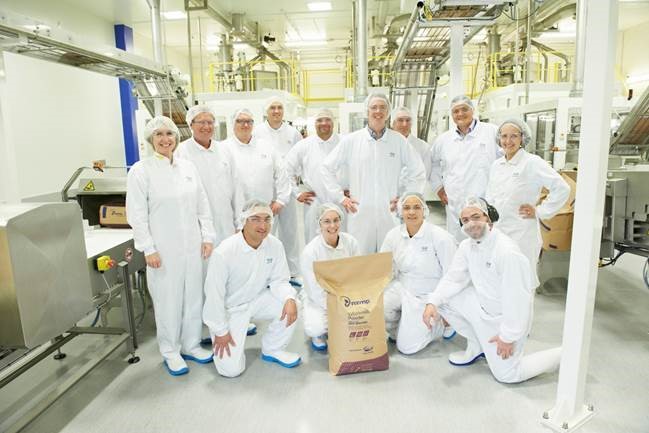
Fonterra’s newest high-efficiency milk powder plant features the world’s joint-largest dryer, which has just come online in the South Waikato. The new dryer is expected to help provide dairy nutrition to more than 20 markets around the world.
The ‘30 metric tonne an hour’ dryer at the co-operative’s Lichfield site is capable of processing an additional 4.4 million litres of milk each day – equivalent to almost two Olympic swimming pools – into high quality milk powder for global markets.
Large scale dryers such as this play a key role in driving value for the business, says Fonterra’s Chief Operating Officer Robert Spurway. “Premium milk powder is a valuable product for Fonterra in its own right, but people often underestimate the strategic importance of powder production to the Co-operative’s overall asset mix,” he says.
“The capacity these assets give us takes the pressure off during the peak of the season, meaning we have more freedom to prioritise milk into higher returning products.”
“Our goal is to strike a balance in our assets that enables us to switch between products quickly to meet demand changes in global markets, push the pace on production when milk volumes dictate, and ultimately deliver the best product mix to generate returns,” says Spurway.
South Waikato Operations Manager Sam Mikaere says opening the new dryer is the culmination of more than two years of focus and effort from teams around the world. “The successful commissioning of this project is the result of an exceptional breadth of experience and knowledge. We sought expertise locally, nationally and globally from more than 200 companies and their dedication has seen the project come in on time and well under budget.”
The dryer is supported by a new distribution centre and a sophisticated  wastewater treatment plant.
wastewater treatment plant.
The distribution centre has the capacity to store 40,000 metric tonnes of whole milk powder which is then loaded into containers and shipped directly to port via an in-built rail siding. This provides a very cost effective infrastructure and helps reduce the number of trucks on road.
A new biological wastewater treatment plant is capable of turning dairy waste into fertiliser which is then irrigated onto neighbouring farmland to help pastures flourish – part of the co-operative’s commitment to environmental sustainability.



